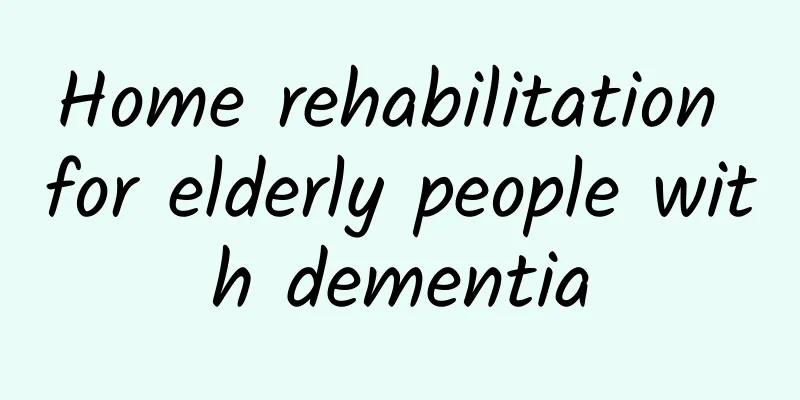Home rehabilitation for elderly people with dementia

|
It is estimated that by 2050, the number of people with dementia in my country will exceed 20 million, 10% of people over 75 years old will suffer from cognitive impairment, and 1/3 of people over 85 years old will suffer from dementia. Currently, family care has become the main way of caring for the elderly in my country. However, due to insufficient nursing knowledge and experience, incidents such as accidental loss, behavioral disorder, and falls of the elderly are emerging one after another, bringing heavy psychological pressure and life burden to the sick elderly and their families. | Life Care 1. Memory training (1) Maintenance of long-term memory: Accompanying patients to look at old photos, recall past events, and encourage them to tell their own stories. (2) Improve their logical reasoning ability: guide patients to classify and recall pictures, phrases or real objects. (3) Improve short-term memory ability: Use methods such as remembering numbers, asking for dates, repeating phone numbers, and recalling the names of previously shown objects such as pens, glasses, and keys. (4) Train their delayed memory ability: by showing several daily necessities such as pens, glasses, keys, etc., and asking the patient to recall the name of the items shown before 5 seconds, guiding the patient to memorize a piece of information, repeat the information at a certain interval, repeat it and gradually extend the interval time, etc. 2. Thinking training: Train the elderly to have comprehensive analysis, judgment, reasoning and calculation abilities, and make full use of their remaining brain power. For example, arranging numbers: give the elderly 3 number cards, arrange them in order from small to large, and then give them another number card each time, and ask them to insert the number into the 3 cards they have arranged according to the size of the number. Train reasoning: From tools, animals, plants, food, etc., randomly point out one item such as food, and ask him to say as many things related to food as possible. Training classification: Give the elderly a list of 30 items and tell them that these 30 items belong to one of the three categories of food, furniture, and clothing, and ask them to classify them. Other examples include brain teasers, riddles, group discussions, and current affairs commentary; other word games, name-remembering and matching games. Although these activities may not necessarily improve memory, they can help the elderly develop different strategies and enhance their confidence. Therefore, such activities can also be regarded as auxiliary strategy exercises, or even as a general method of stimulating intelligence. 3. Music therapy "Music therapy" is the planned use of music to improve the adaptability of some people who are deficient in intelligence, physical and social aspects to their living environment. It is work for some people, but it may be a recreational activity for others. Its diversity and power involve different levels, including functional, sensory, cognitive, social and emotional. Music has a positive impact on both body and mind, such as promoting mood changes, enhancing emotional responses, promoting emotional health and improving social skills. For some people, it can even enhance the cognition of people, things and places. If combined with some physical activities, it can also help promote health. Music can also soothe and calm some anxious elderly people with dementia. There are many types of music activities, including listening to music, singing, playing percussion instruments, music gymnastics, etc. Moreover, music activities can be integrated into daily life. Playing different music at different times can help the elderly to understand time. 4. Improve your diet. Having a good diet can effectively prevent Alzheimer's disease. The activity of brain nerve cells requires sufficient protein, heat energy, lecithin, choline, vitamins, trace elements, etc. To this end, we must first achieve a balanced diet and eat more foods rich in zinc, manganese, selenium, and germanium, such as seafood, shellfish, fish, milk, beans, nuts, silkworm pupae, garlic, mushrooms, etc., which are very beneficial for preventing the occurrence of Alzheimer's disease. | Spiritual Care 1. Remembrance therapy "Remembrance therapy" is a widely used treatment medium in geriatric psychiatry and is suitable for the treatment of senile dementia and senile depression. Remembrance can be carried out in different forms, including individual recollection, interviews with people, group sharing, exhibitions and dramas. Due to its diversity and easy integration into daily activities and conversations, many hospitals and institutions serving the elderly are happy to adopt it. Since long-term memories are tangible materials, the elderly can express their opinions and emotions without pressure. When sharing past years and achievements, the personal dignity of the elderly is maintained and it helps them to reaffirm themselves. At the same time, the elderly will feel accepted and understood, and sharing with others also provides an opportunity for learning and recognition, so that the elderly can get greater support to face current or future challenges. Generally, remembrance activities combine happy and unhappy memories. Because focusing too much on happy memories will lead to escapism, while focusing only on unhappy past events will make the elderly depressed. Therefore, trainers should be cautious. Some studies have also shown that appropriate remembrance activities can help increase the life satisfaction of the elderly, reduce depression and improve the quality of life. | Exercise therapy With bare hands or with the aid of equipment, the elderly can practice various methods to improve motor function, restore motor function, and prevent and treat muscle atrophy and joint stiffness. Movement therapy combined with brain stimulation training and moderate exercise can not only prevent the elderly from living indoors and reduce the occurrence of apraxia, but also have a good effect on improving mental symptoms such as depression. 1. Simple (1) Walking is one of the best exercises. It is simple and effective. You can walk in the house, yard, or outdoors. No matter how long you walk, it is very good for your body and mind. You can combine walking with other chores, such as picking up packages, walking the dog, or shopping. (2) Sit-and-stand exercises: Sitting and standing up in a chair repeatedly can strengthen the muscles needed for basic activities (such as going to the toilet). (3) Stand and maintain balance. If the elderly cannot stand steadily, they need to maintain support. They can exercise independently or as part of their daily life, such as washing dishes or watching TV while standing. (4) Sit upright without support for a few minutes each day (supervision is required to prevent falls) to strengthen the abdominal and back muscles. (5) Stretch while lying in bed, moving various parts of the body and stretching stiff muscles. 2. Mild (1) For stretching or strength training, you can try chair exercises. (Related exercises: How can elderly people exercise safely? These 18 exercises can exercise the whole body while sitting on a chair) (2) For Tai Chi, you can look for some video tutorials or seek guidance from a professional teacher. (3) Simple labor such as gardening and weeding can give people a sense of accomplishment and is a good way to exercise. (4) Household chores, such as folding clothes, cleaning the kitchen, vacuuming, etc. | Rehabilitation training precautions To make it easier for the elderly to walk alone and prevent falls, handrails should be installed in corridors, aisles, bathrooms or toilets. The amount of motor function rehabilitation training should be based on the elderly's physical strength, endurance, age, hypertension, heart disease and diabetes, etc., and should be carried out step by step without causing fatigue. In addition, the elderly often have osteoporosis, so they should move gently during training and pay attention to protection to avoid fractures. |
<<: BrightEdge: More than 50% of websites use social sharing tools
>>: Rehabilitation training for elderly people with swallowing disorders
Recommend
To treat depression, some people choose not to sleep
Leviathan Press: On the one hand, modern medicine...
How to treat second degree cervical erosion?
Cervical erosion can be divided into three degree...
How to effectively treat acute gonococcal urethritis
Acute gonococcal urethritis is more common in mal...
Why does a woman feel a tingling pain under her left armpit?
The pain produced in our body can actually be div...
Do you know how to treat hemorrhoids?
Now, do you know what disease has an incidence ra...
The reason why menstruation suddenly decreases
With the improvement of living standards, the pre...
What medicine is used to treat fungal vaginitis
Women often feel discomfort in specific parts of ...
Fortune: Top 50 Global Artificial Intelligence Innovators in 2023
Fortune released the first Fortune 50 list of glo...
How to treat moderate cervical erosion?
Cervical erosion brings great shadow to women. Ma...
Things to note when weaning, keep these in mind!
After stopping breastfeeding, a woman's body ...
Can I use tampons after an abortion?
Tampons are a new type of product for women durin...
Can I get pregnant if one side of my fallopian tube is open and the other side is blocked?
Nowadays, people will have problems of one kind o...
The best time to cesarean section for second child
If a pregnant woman wants to have a cesarean sect...
How thick is the cervix?
The uterus is the place where the fetus survives....
What is the reason for small pimples on the female vulva
When a woman is infected, the first place to be a...









